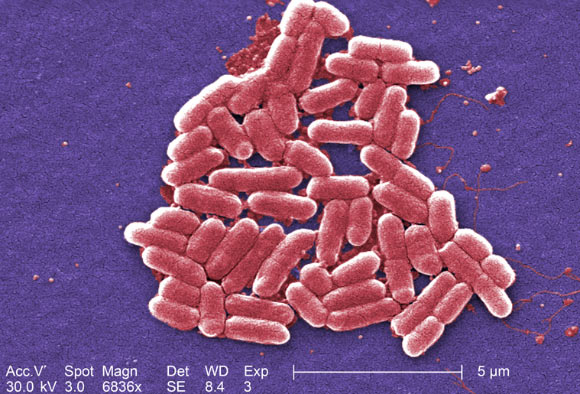For the second time, a clinical strain of Escherichia coli with the colistin resistance gene mcr-1 has been detected in humans in the United States, according to a team of scientists led by Dr. Mariana Castanheira of JMI Laboratories in North Liberty, IA.

Escherichia coli. Image credit: Janice Haney Carr / CDC.
Dr. Castanheira and her colleagues, who coordinate the worldwide SENTRY Antimicrobial Surveillance Program, tested more than 20,000 clinical strains of E. coli and Klebsiella pneumoniae that had been collected from hospitals in the Asia-Pacific region, Latin America, Europe, and North America in 2014-2015.
The team found that 390 were resistant to colistin, a ‘last-resort’ antibiotic against multi-drug resistant gram-negative bacteria, and that 19 of these isolates carried the mcr-1 gene.
The 19 isolates originated in ten countries representing all of the above regions. However, only one, an isolate of E. coli that was originally recovered in 2015 from a patient in New York, came from the United States.
Previously, a single isolate containing mcr-1-positive E. coli was identified from a patient in Pennsylvania.
“The isolates that tested positive for mcr-1 were susceptible to several commonly used antimicrobial agents, including carbapenems, and recently approved anti-microbial agents that can be used against gram-negative bacteria, generally,” Dr. Castanheira said.
“These and similar isolates are unlikely to cause hard to treat infections at this time.”
A key question the team is currently working to answer is whether the mcr-1 gene is plasmid-mediated in the isolates they have identified.
The plasmid-mediated mcr-1 was first isolated from food animals and humans in China, in late 2015.
“Given this possibility, and the potential of plasmids to jump to other bacteria, especially to those that are already resistant to other antibiotics, as well as the mcr-1 gene’s global distribution, close monitoring of the gene is warranted,” the scientists said.
“The fact that the gene has been detected in food livestock and raw meat is also concerning,” Dr. Castanheira added.
“The prospect of a mobile gene encoding resistance to colistin spreading among isolates resistant to most antimicrobial agents clinically available is threatening for the therapy of serious infection caused by isolates.”
The team’s findings were published online July 11 in the journal Antimicrobial Agents and Chemotherapy.
_____
Mariana Castanheira et al. Detection of mcr-1 among Escherichia coli clinical isolates collected worldwide as part of the SENTRY Antimicrobial Surveillance Program during 2014-2015. Antimicrob. Agents Chemother., published online July 11, 2016; doi: 10.1128/AAC.01267-16







